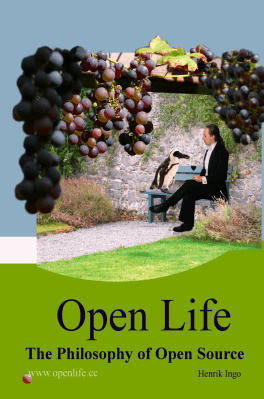 Are French farmers a bunch of mean-spirited creeps? Are all nerds courageous, and laziness a virtue? Why did Stephen King leave a horror story unfinished? What business models survived the Internet bubble? Among the many entertaining and thought-provoking ideas presented in Open Life, ants screw up, and Harry Potter even casts his spell in German. The hot topics in information technology (IT) right now are Linux and Open Source. But what does Open Source offer those, who may not see their computer as a matter of life and death? Open Life: The Philosophy of Open Source spotlights the people, businesses, values and practices of the Open Source world. In assessing its development Open Life recounts over 60 case-study-like stories that illuminate exactly what is so miraculous and wonderful in this new paradigm for producing software.
Are French farmers a bunch of mean-spirited creeps? Are all nerds courageous, and laziness a virtue? Why did Stephen King leave a horror story unfinished? What business models survived the Internet bubble? Among the many entertaining and thought-provoking ideas presented in Open Life, ants screw up, and Harry Potter even casts his spell in German. The hot topics in information technology (IT) right now are Linux and Open Source. But what does Open Source offer those, who may not see their computer as a matter of life and death? Open Life: The Philosophy of Open Source spotlights the people, businesses, values and practices of the Open Source world. In assessing its development Open Life recounts over 60 case-study-like stories that illuminate exactly what is so miraculous and wonderful in this new paradigm for producing software.
Divided into four parts, Open Life starts rather philosophically by comparing the concepts of openness and mean-spiritedness with a clarity that highlights the latter's devious impact on our everyday life. Part Two explores the Open Source culture from the time Linus Torvalds began writing code for his new operating system, how he behaves as a leader, and stating the virtues of a programmer. Part Three comprehensively reviews some Open Source business models and evaluates both their economic and ethical sustainability. Leaving the world of software behind, Part Four considers how successfully open business models can be applied in fields as diverse and wide-ranging as mining, literature, and fashion design. The Finnish edition of Open Life, published May 2005, was praised in Talouselämä, Finland's main financial magazine: "True to the Open Source culture, the book is freely downloadable on the net. It is certainly a business book well worth its price.' In a Usenet discussion, one participant said: "...I just read the Open Life book, and I'm feeling a bit emotional.' A buying customer said: "I just printed it all from the net, but it is so good I felt I should support it by buying it [...] I've never in my whole life read a complete book from beginning to end. In school I skipped every second page. Now I read the first 60 pages and decided to still read one more chapter before going to sleep [...] but realising now it's 6 a.m. I'll just place this order and go to bed.'
A book about the Internet age, itself available both online and in paperback
Open Life: The Philosophy of Open Source rides on the wave of a new kind of publishing in the Internet age. It is available both in paperback in bookstores and online stores and for free online browsing and download, readers are invited to comment on the online version. You can even download the book covers if you want to print a complete book for yourself. Reading the online version is completely free of charge, although it is possible to give the author a voluntary tip. For each sold paper copy the author donates $2 per book to a common good cause:
- A main source of my personal Open Source knowledge has been Linux Weekly News. I therefore want to use $1 for each sold book to donate LWN subscribtions to students in developing countries.
- Another $1 will be donated to The Foundation for a Free Information Infrastructure (FFII) that among other things is the central force in blocking repeated attempts to introduce software patents in Europe.
Copy and download freely on Open Source terms
Open Life: The Philosophy of Open Source is not just a book about Open Source, it is itself available on Open Source terms. The source documents and images are available and it is possible for anyone to use parts of the book in other works, or publish shorter (or longer) versions of the book. There is also a collaboratively edited book on this site, which is destined to become a second edition of Open Life. Free copying, redistribution and modification are allowed thanks to the Creative Commons licenses. The cover image was composed of photographic images that were Creative Commons licensed by others. You can read more about Creative Commons here. (The epilogue by Linus Torvalds was first published as part of the Linux kernel documentation and is available in this book and for copying by others under the terms of the GPL license, which is also used for the Linux kernel itself.)
- 57933 views

Recent comments
I have…